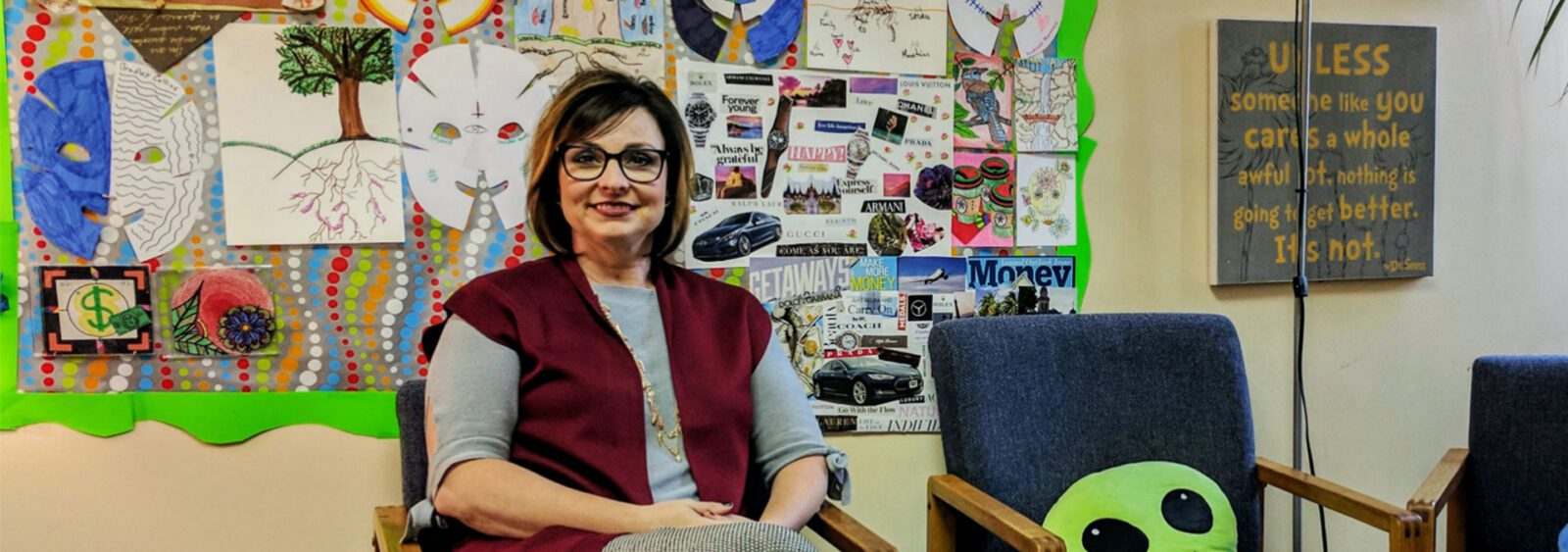Shelli Yearsley: Passionate Compassion


When in college, Shelli was interested in understanding what makes people tick, which lead to her receiving a minor in sociology. It wasn’t until she had her own children that she exposed herself to the work that would shape her career. Shelli’s body hasn’t always been her most reliable ally, and after one child it was clear that giving birth a second time wasn’t in the cards. She adopted a boy through an agency, which, among other things, exposed her to the amazing field of social work. Following this, she began working for the adoption agency and stayed on for 5 years.
While working with the birth parents of children to be adopted, most of whom were teenagers; she caught the bug for supporting teens through challenging times. Many of the people she worked with struggled with addiction, which was often partly responsible for the unplanned child.
After working with the adoption agency, Shelli went on to receive her Masters in Social Work. She picked up all the info she could on addiction along the way. Since receiving her Masters, Shelli Yearsley has worked with Douglas County Schools, Parker Valley Hope, and has a private practice.
When she heard about Sandstone Care, she immediately got in touch with our executive clinical director, Dianna Sandoval. She saw potential she hadn’t found anywhere else. Dianna promised her the ability to use creative and experiential interventions, and the autonomy to meet clients where they are. Sandstone Care laid out a foundational curriculum to help guide the treatment process in a way that aligned well with Shelli’s approach.
Besides, she has relished the ability to take time for personal and professional development which the organization supports and endorses. She notes that while other places she has worked have talked about professional development, none had given her the time and encouragement to work on what she needed.
Along her path, Shelli Yearsley has picked up some knowledge. The son she adopted just graduated from high school. She graduates teens from her Intensive outpatient group on a rolling basis and just as her own son, they forge onward without her daily presence, but not without being touched by her compassion.
This compassion comes from years of working with teens. Shelli understands where the teens are coming from. After working in the schools for several years, she has seen all the pressures and dynamics to which middle and high school students are exposed.
She tells me that she has found that, “more love and more compassion is always the answer.” Over time, she has become less concerned with boundaries and more focused on making sure that people know they are loved and accepted no matter what they do.
Using this approach, she isn’t in the business of forcing her clients to do anything. Changing habits is challenging work, especially when it comes to substance use. Shelli recognizes that she can’t do the work for her clients. She says, “they’ve gotta come to their own passion, they’re own sense of self-worth, that they’re good enough to make all these changes for their body and their future.”
This approach can take patience, something Shelli has been accruing over the course of her career. Over the years, she has run into her own judgment of herself and others. Her own impatience has been revealed to her over and over, constantly reminding her of how hard this tenant can be.
She has learned the patience and acceptance of not jumping to early judgments. “Nothing is ever what it seems“ especially in the addiction world, where the person that walks into our facilities for the first time is different than the sober person that Shelli gets to know over time. She does her best to accept people and help them feel comfortable in her office, trusting that if they feel loved they will settle in and get real about who they are and what they need.
As she speaks about teenagers making changes, she is animated and completely present. At times she seems on the edge of tears while sharing her her story. I can feel that she would do anything for her clients, even when the hardest choice can be letting them learn from their own mistakes without rescuing them.
“There’s no such thing as a perfect kid, no such thing as a perfect family…we all just do the best we can.” And that’s what Shelli strives for as well. She is the first to admit that she’s not a perfect parent or therapist. Shelli shows up every day with a passion for her job and compassion for those with whom she works. Shelli Yearsley began this work when caring social workers guided her through the adoption process, and she continues to give back everything she has learned along the way.